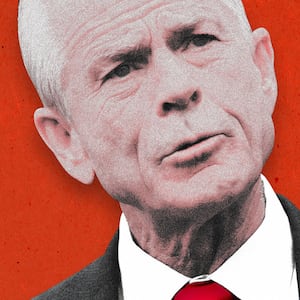With the National Archives now at the center of a historic fight over records between the current and former president, the two people who once ran that agency are both condemning Trump administration officials for trying to keep documents secret.
Don W. Wilson and John W. Carlin each had years-long stints as the official archivist of the United States, overseeing the massive effort of sorting through presidential records that tell the country’s story.
And they’re dismayed at former President Donald Trump’s aggressive attempts to keep his White House records locked away from the special congressional committee investigating the Jan. 6 insurrection—and his potential role in it.
“Given how frantic they are... there are things in those records that are going to make real trouble. I’m talking about prison time,” Carlin mused to The Daily Beast. “It reinforces the fact that they know they’re in real trouble if these things are released—particularly if they’re released soon.”
An outgoing president’s White House records go straight to the National Archives and Records Administration, where they could be kept away from the public for up to 12 years. However, President Joe Biden waived that presidential privilege when he allowed the bipartisan House Jan. 6 Committee to request some documents about Trump’s final weeks in office. Trump sued to block that, and his odd claims of “residual” executive privilege got knocked down by a federal judge who noted “presidents are not kings” and an appellate panel that found his argument has “no basis.” This epic fight over records is now reaching the Supreme Court.
Those records could show whether the Trump White House plotted to use the Department of Justice to intimidate states to reject 2020 election results, schemed with rogue Republicans in Congress to halt certification of Electoral College votes that reflected Biden’s win at the polls, and interacted with rally organizers who brought the crowds that violently attacked the U.S. Capitol building.
“It’s important that records are used to get the truth out. Nothing highlights that more than the controversy we're going through. Records are going to have a huge impact in determining who did what, particularly as you get to the Justice Department,” Carlin said.
Carlin compares Trump’s reticence to the secrecy of Richard Nixon, who was forced to turn over White House tapes by the Supreme Court and resigned in 1974 rather than face impeachment for his crooked tactics. For perspective, Carlin points to his decade at the archives from 1995 to 2005, when he battled the Nixon family over control of records.
“Nixon knew that tapes were going to kill him, and so he obviously fought and said they weren’t records. They were, because they were created in the Oval Office,” said Carlin, a former governor who now lectures at Kansas State University.
That fight is also playing out in the case of former Trump Chief of Staff Mark Meadows, who has already turned over more than 9,000 pages of material to the congressional committee but keeps holding back some communications. Meadows drew rebuke when he asserted that some of his text messages and emails were protected from disclosure because of “presidential privilege,” even though they were on his personal cellphone and two personal Gmail accounts.
Wilson, the other former national archivist, told The Daily Beast that keeping official documents on personal devices is a clear violation of the Presidential Records Act.
“You aren’t supposed to conduct personal business on your cellphone. If it is, then it’s an official record. Is this official business? If it is, then it’s technically a presidential record, even if it’s on your personal cellphone,” Wilson said. “All of it is supposed to be turned over at the end of the administration.”
And this is an issue Wilson knows well. He served as the nation’s archivist from 1987 until 1993, which he said was the first time the agency dealt with emails and other electronic messages.
Carlin concurred, saying that Meadows must recognize White House activity is official business no matter where it’s recorded.
“Maybe he thought he was somehow protected. It would be like writing a letter as a government official, then saying, ‘I wrote that on paper I bought and paid for, not federal paper.’ Baloney!” he said. “If that were allowed, you could have crooks in your administration and say, ‘Make sure you do all this on your own stuff. Don’t use any government typewriters.’”
It’s been two weeks since the House of Representatives voted Meadows “in contempt of Congress” and recommended he be prosecuted by the Justice Department, although criminal charges haven’t yet been filed. His cellphone activity appears to be the center of this storm, as he was quietly turning over evidence until he discovered that the committee had subpoenaed Verizon for his old phone’s records—at which point he cried foul and sued the committee.
Another fight over presidential records might come from former Vice President Mike Pence. In the book Betrayal by reporter Jon Karl, the ABC News chief Washington correspondent details how an official White House photographer captured images of Pence hidden for hours in the bowels of the Capitol while it was under attack. During a guest appearance on The Late Show, Karl told host Stephen Colbert, “They refused to let me publish the photographs. But I have a suspicion that the January 6th Committee is going to want to see those photos.”
“And those aren’t his photos,” Colbert responded. “We paid for those photos. Those are part of the national archives.”
Wilson and Carlin concur.
“There’s no question about that. The vice president, as he leaves office, doesn’t get to say, ‘They can’t see this.’ They’re creating records, and they’re all permanent. And they belong to the United States of America,” Carlin told The Daily Beast.
“I’m really kind of glad to see the special committee and the archives’ role in the middle of this. It does bring attention to presidential records and how important they are—not just for current events but for the future of the country,” Wilson said. “Archives aren’t just a repository. It’s preserving our national history.”
The Daily Beast has filed a public records request with the National Archives seeking the Pence photographs—if they were turned over—and related material. But the agency said the photograph collection is not subject to the Freedom of Information Act until 2026.



